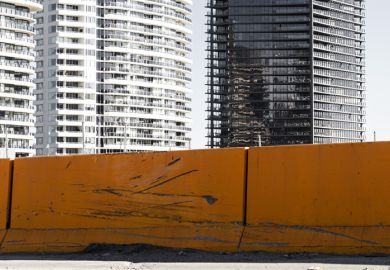Australia’s representative association for student accommodation developers has rebuffed claims that international students have fuelled a housing squeeze, saying people offering short-term holiday rentals and “repurposing second bedrooms into home offices” are equally to blame.
A “myth-busting” report commissioned by the Student Accommodation Council says the post-Covid return of overseas students is just one of six “demand drivers” that are raising rents and reducing housing availability. Others include natural population growth, skilled migration, a flight from the cities and skyrocketing house prices which force would-be buyers to keep renting instead.
Meanwhile a decrease in average household sizes since 2019, possibly because of remote work arrangements, has increased the overall need for housing.
Yet overseas students have taken the heat, as evidenced by headlines blaming soaring rents on an “unplanned, record increase” in international student admissions, and proposing visa caps to relieve the Australian housing “misery machine”.
The report says publicly available data contradicts the proposition that overseas students have fuelled rent spirals. It says median rents surged by up to 30 per cent between 2019 and 2023, while foreign student numbers rose by just 4 per cent and their arrivals declined by 13 per cent – suggesting “limited correlation” between rents and student intakes.
The council’s executive director, Torie Brown, said international students had been “unfairly blamed” for the rental crisis. “This report shows that long term structural issues in Australia’s housing market are the real cause for rental pressures,” she said.
“We need to look at the broad spectrum of issues driving up rent and reducing the supply of homes, rather than blaming a single cohort. There are more domestic [than international] students in rental homes, yet no one is suggesting we ban share-houses for local university students.”
The report says “supply constraints” have also been largely overlooked in the public discourse about housing availability. They include rising construction and finance costs, builder shortages, planning restrictions, development approval delays, inadequate urban infrastructure and landlords’ preferences for short-stay accommodation over long-term rentals.
Foreign students have almost no impact on accommodation availability in most parts of Australia, constituting fewer than 1 per cent of renters in almost three-quarters of the country’s local government areas, the report adds.
It says local home seekers experience only limited competition from foreign students, who generally prefer different types of accommodation, and comprise just 3 per cent of renters in stand-alone houses – the option overwhelmingly favoured by Australian families.
Nevertheless, almost 240,000 international students are renting Australian houses and apartments with just 47,000 in purpose-built student accommodation (PBSA), the report suggests. It says this is unlikely to change significantly in the short term, with fewer than 8,000 additional PBSA beds scheduled to come online by 2026.
The council’s chair, Anouk Darling, said “slow planning systems, high property taxes and clunky state-based legislation” were hampering the construction of student accommodation which could “alleviate pressure on the private rental market”.
A 2023 analysis of almost 20 years of rental data, conducted by conservative thinktank the Institute of Public Affairs, found an association between high net international student intakes and hikes in average rental prices. “For every net intake of 100,000 international students, there is an associated 1.5 percentage point increase to rental price inflation,” it said.
Register to continue
Why register?
- Registration is free and only takes a moment
- Once registered, you can read 3 articles a month
- Sign up for our newsletter
Subscribe
Or subscribe for unlimited access to:
- Unlimited access to news, views, insights & reviews
- Digital editions
- Digital access to THE’s university and college rankings analysis
Already registered or a current subscriber?








